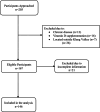Vitamin D Knowledge, Attitudes, Practices and Serum Concentration Among Pregnant Women Attending a Malaysian Tertiary Hospital
- PMID: 40641567
- PMCID: PMC12241716
- DOI: 10.1002/fsn3.70575
Vitamin D Knowledge, Attitudes, Practices and Serum Concentration Among Pregnant Women Attending a Malaysian Tertiary Hospital
Abstract
Vitamin D deficiency is increasingly recognized as a public health concern among pregnant women due to its association with adverse pregnancy outcomes. Inadequate knowledge, attitudes, and practices (KAP) related to vitamin D may contribute to this issue. The study aimed to evaluate the KAP and serum vitamin D concentration among pregnant women. The study was a hospital-based cross-sectional study involving pregnant women residing in the Klang Valley area. Relevant data on sociodemographic characteristics, knowledge, attitudes, practices, and physical activity were collected using a structured questionnaire. Blood samples were collected using the veni puncture technique, and serum vitamin D levels were measured using the electrochemiluminescence immunoassay (ELCIA) technique. There was a significantly higher proportion of participants with good knowledge as compared with participants with poor knowledge (54.1% vs. 45.9%); p = 0.015. There was a significantly higher proportion of participants with negative attitudes as compared with positive attitudes (54.8% vs. 45.2%); p = 0.0001 and inconsistent practice level (50.7% vs. 49.3%); p = 0.953. The prevalence of vitamin D deficiency was 64.4%. Further analysis revealed that non-Malay participants had significantly higher odds of having good knowledge of vitamin D compared to Malays (aOR = 0.420, p = 0.027). Employment status was significantly associated with good practices. Employed participants were two times more likely to demonstrate vitamin D-related practices (aOR = 2.036, p = 0.049) compared to their unemployed counterparts. There were no significant associations between sociodemographic characteristics and participants' attitudes on vitamin D. Despite the high levels of knowledge about vitamin D among the participants, the majority had negative attitudes, inconsistent practice levels, and a high prevalence of vitamin D deficiency. The findings underscore the need for policies and culturally acceptable strategies aimed at promoting attitudes and practices to prevent vitamin D deficiency in pregnancy.
Keywords: attitudes; knowledge; practices; pregnant women; vitamin D; vitamin D deficiency.
© 2025 The Author(s). Food Science & Nutrition published by Wiley Periodicals LLC.
Conflict of interest statement
The authors declare no conflicts of interest.
Figures
References
-
- Abdullah, N. , Mohamed N. A. E., Al‐Qerem W., et al. 2021. “A Need for Improvement in the Knowledge, Attitudes and Practice Toward Vitamin D Among University Students.” Bahrain Medical Bulletin 43, no. 2: 482–490.
-
- Aghaei, F. , Heidarnia A., Allahverdipour H., Eslami M., and Ghaffarifar S.. 2021. “Knowledge, Attitude, Performance, and Determinant Factors of Vitamin D Deficiency Prevention Behaviours Among Iranian Pregnant Women.” Archives of Public Health 79: 224. 10.1186/s13690-021-00712-2. - DOI - PMC - PubMed
-
- Aghajafari, F. , Nagulesapillai T., Ronksley P., Tough S., O'Beirne M., and Rabi D.. 2013. “Association Between Maternal Serum 25‐Hydroxyvitamin D Level and Pregnancy and Neonatal Outcomes: Systematic Review and Meta‐Analysis of Observational Studies.” British Medical Journal 346: f1169. 10.1136/bmj.f1169. - DOI - PubMed
LinkOut - more resources
Full Text Sources


